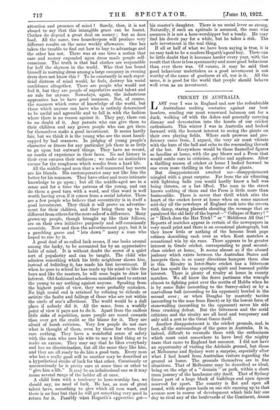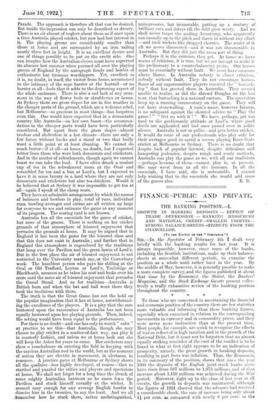CRICKET IN AUSTRALIA.
I AST year I was in England and saw the redoubtable Australians making centuries against our best bowlers, sending our most renowned batsmen out for a duck, walking off with the Ashes and generally carrying dismay and devastation into the hearts of our cricket enthusiasts. This winter I was in Australia and looked forward with the keenest interest to seeing the giants on their own playing fields. Where such prowess and pro- ficiency came from, I argued, the very air must vibrato with the hum of the ball and echo to the resounding thwack of the bat. Everywhere would be those flannelled figures so familiar at home, with the gay blazer and a Press that would outdo ours in criticism, advice and applause. After a thrilling season of cricket at home I looked forward to one even more thrilling in the home of the giants.
But disappointment awaited me—disappointment mingled with a great surprise. Far from the air vibrating with lightning balls you would hardly know a ball was being thrown, or a bat lifted. The man in the street knows nothing of them and the Press is little more than businesslike. There is never that thrill which stirs the heart of the cricket lover at home when on some summer mid-day all the newsboys of England rush into the streets with damp, staring placards shouting the message that so paralysed the old lady of the legend—" Collapse of Surrey! " or " Hitch does the Hat Trick! " or " Middlesex All Out ! " Reports of matches appear in certain of the newspapers in very small print and there is an occasional photograph, but they know little or nothing of the famous front page column describing each over as when Kent snatches a sensational win by six runs. There appears to be greater interest in Grade cricket, corresponding to good second- class cricket at home, It seems almost as if the absurd jealousy which exists between the Australian States and hampers them in so many directions hampers them also in this. Rivalry in Inter-State cricket has a bitterness that has spoilt the true sporting spirit and lessened public interest. There is plenty of rivalry at home in county matches. We all know the fierce partisans who wrangle almost to fighting point over the merits of Hobbs when he is by some fluke (according to the Surrey-eider) or by a marvellous ball (according to his opponent) bowled in the second over ; or when Douglas by masterly tactics (according to the man from Essex) or by the lowest form of stonewalling (according to the opponent) saves his side from crushing defeat. But the bitterness and the acrid criticism and the rivalry are all local and temporary and only add a zest to the Great Game itself. Another disappointment is the cricket grounds, and, in fact, all the surroundings of the game in Australia. It is, indeed, difficult to reconcile them with the enthusiasm which must exist somewhere to have bred the mighty team that came to England last summer. I did not have an opportunity of visiting the Adelaide ground, but those at Melbourne and Sydney were a surprise, especially after what I had heard from Australian visitors regarding the ground at home. The grounds themselves are in fine situations. That of Melbourne may be described as ideal, being on the edge of a " domain " or park, within a short tram journey of the handsome city itself. That of Sydney forms part of a huge block of buildings and open spaces reserved for sport. The country is flat and open all round, with wide grass lands on one side running up to that avenue now in course of development which bids fair one day to rival any of the boulevards of the Continent, Anzac Parade. The approach is therefore all that can be desired. But inside the impression can only be described as dreary. There is an air almost of neglect about them as if once upon a time Australia played cricket, but now had lost interest in it. The playing greens are considerably smaller than those at home and are surrounded by an iron railing nearly three feet in height. It is an excellent device and one of things possibly to be put on the credit side. One can imagine how the Australian eleven must have regretted its absence last summer when pursued all over the playing greens of England by the autograph fiends and hordes of enthusiastic but tiresome worshippers. Yet, excellent as it is, no doubt, in itself, the visitor from home, accustomed to the intimacy of the rope barrier or the footrail—or no barrier at all—feels that it adds to the depressing aspect of the whole enclosure. There is also a sad lack of any orna- ment in the way of flower beds or shrubberies or lawns. At Sydney there are grass slopes for use in fine weather in the cheaper parts of the ground, which are a welcome relief, but Melbourne—so gracious in most things—has forgotten even this. One would have expected that in a democratic country like Australia—on her own beast—the accommo- dation in the cheaper parts would have been particularly considered. But apart from the grass slopes—almost treeless and shelterless in a hot climate—there are only a few forms without backs and a stand or two that badly want a little paint or at least cleaning. We cannot do much better—if at all—at home, no doubt, but I expected better from those who were both democrats and cricketers. And in the matter of refreshments, though again we cannot boast we can take the lead. I have often drunk a modest cup of tea in the refreshment room at the Oval and scrambled for tea and a bun at Lord's, but I expected to have it in some luxury in a land where they are not only democrats and cricketers but also tea-drinkers. Would it be believed that at Sydney it was impossible to get tea at all—again I speak of the cheap seats.
They have an admirable arrangement by which the names of batsmen and bowlers in play, total of runs, individual runs, bowling averages and extras are all written up large for everyone to see and estimate the game at any moment of its progress. The scoring card is not known. Australia has all the essentials for the game of cricket, but none of the graces. There is nothing on her cricket grounds of that atmosphere of leisured enjoyment that pervades the grounds at home. It may be argued that in England it has been the game for the leisured class and that this does not exist in Australia ; and further that in England this atmosphere is engendered by the traditions that hang over the Pavilion and the green lawns of Lord's. But in the first place the air of leisured enjoyment is not restricted to the University match say, or the Canterbury week. The humblest person who pays his shilling at the Oval or Old Trafford, Ley-ton or Lord's, Tonbridge or Blackheath, assumes as he takes his seat-and looks over his score card the same air of leisured enjoyment that pervades the Grand Stand. And as for tradition—Australia is British born and when the bat and ball went there they took the traditions with them.
The truth is that the Great Game has not the hold on the popular imagination that it has at home, notwithstand- ing the excellence of the players. It is a pity that the care bestowed upon the racecourses of Australia has not been equally bestowed upon her playing grounds. Then, indeed, the setting would have been equal to the performance. Por there is no doubt—and one has only to watch " cubs " at practice to see this—that Australia, though she may choose to play cricket in a matter-of-fact way, can play it in masterly fashion, and unless we at home look out she will keep the Ashes for years to come. Her cricketers may Show a nonchalance on entering the field in keeping with the careless Australian nod to the world, but at the moment of action they are electric in movement, in alertness, in resource. A practice game at Melbourne or Sydney shows all the qualities—less highly developed, of course—that so startled and puzzled the critics and players and spectators at home. We shall not forget for a long time the slouch of some mighty Australian batsman as he came from the Pavilion and stuck himself casually at the wicket. It seemed easy enough for any average English bowler to dismiss him in the twenties, to say the least. And we all )temember how he stuck there, rather undistinguished, unimpressive, but immovable, putting up a century of brilliant cuts and drives till the field grew weary. And we shall never forget the smiling Armstrong, 'who apparently ran casually up to the pitch and threw in without any effort —and took wickets like dropped cherries. The secret of it all we never discovered—and it was not discoverable in Australia. But they did just the same sort of thing. Perhaps it is the criticism they get. At home we have reams of criticism, it is true, but we are too apt to make it . the preliminary to a counterbalancing praise. Our heroes must be eventually without fault. We must have someone above blame.. In Australia nobody is above criticism, nobody without fault. They do not encourage heroes. Some of our supersensitive players resented the " barrack- ing " that has greeted them in Australia. They seemed unable to realize, as did the shrewd Douglas on the last tour, that barracking is a national custom. The spectators keep up a running commentary on the game. They will not have stonewalling. A man's name, however famous, is no safeguard against the shouted advice to " Play the game ! " " Get on with it ! " We have, perhaps, got too used to the gentlemanly attitude at Lord's, where good deeds are applauded and bad ones passed over in polite silence. Australia is not so polite—and gets better cricket. It would do some of our professionals who play only for their averages good to spend a season playing Inter-State cricket at Melbourne or Sydney. There is no doubt that despite lack of popular interest, despite ridiculous and hampering jealousies, despite rough and ready methods, Australia can play the game as we, with all our traditions —perhaps because of them—cannot play it, at present. She may wrest from us all the honours. In all the essentials, I have said, she is unbeatable. I cannot help wishing that to the essentials she would add some



































 Previous page
Previous page